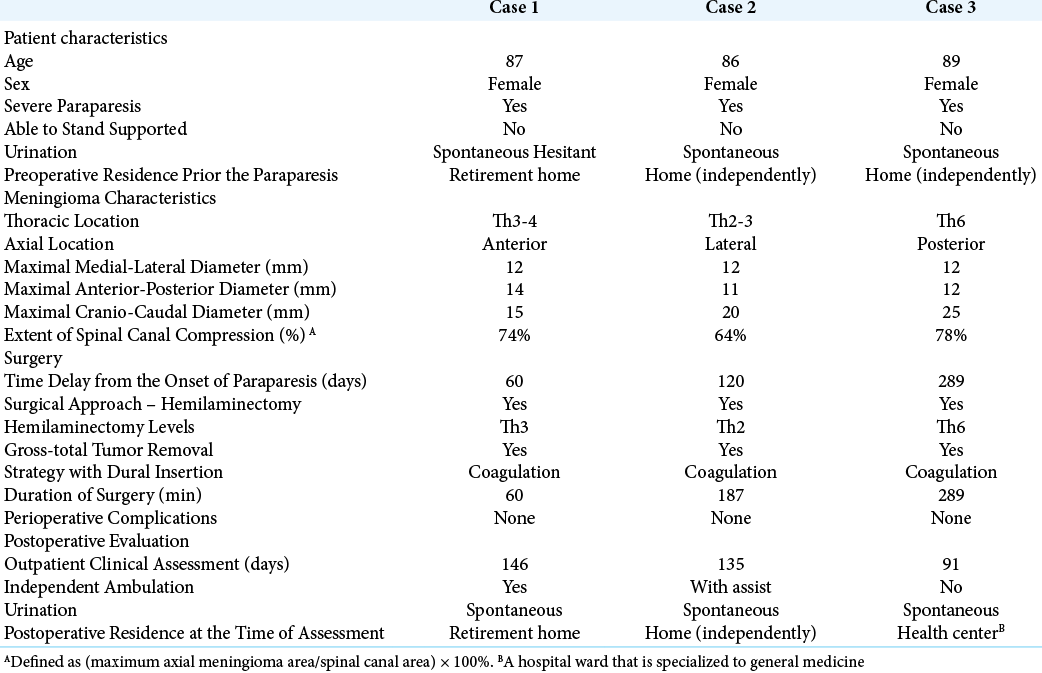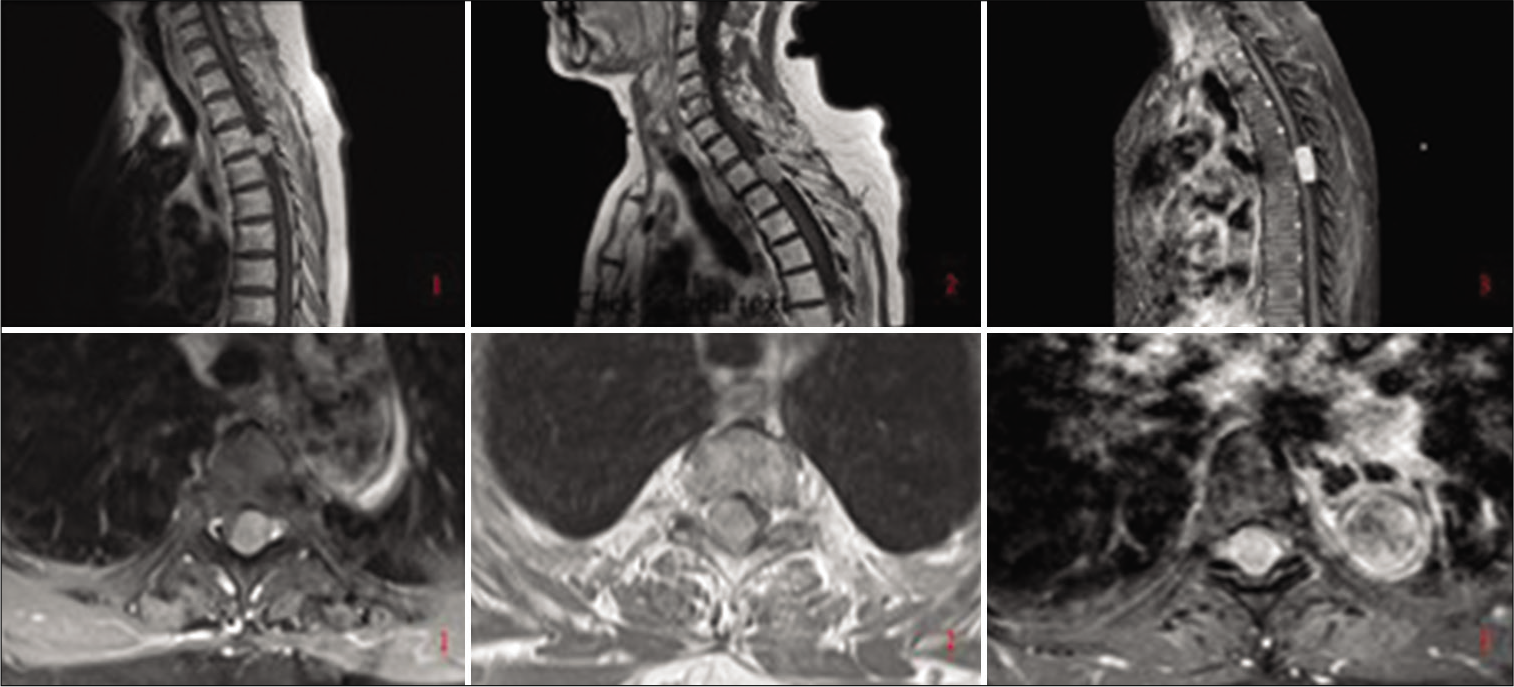- Department of Neurosurgery, Helsinki University Hospital, Helsinki, Finland,
- Department of Neurosurgery, Maastricht University Medical Center, Maastricht, Netherlands.
Correspondence Address:
Ville Vasankari, Department of Neurosurgery, Helsinki University Hospital, Helsinki, Finland.
DOI:10.25259/SNI_943_2021
Copyright: © 2021 Surgical Neurology International This is an open-access article distributed under the terms of the Creative Commons Attribution-Non Commercial-Share Alike 4.0 License, which allows others to remix, tweak, and build upon the work non-commercially, as long as the author is credited and the new creations are licensed under the identical terms.How to cite this article: Ville Vasankari1, Roel Hubert Louis Haeren2, Mika Niemela1, Miikka Korja1. Two out of three of octogenarians benefitted from delayed resection of spinal meningiomas. 08-Dec-2021;12:593
How to cite this URL: Ville Vasankari1, Roel Hubert Louis Haeren2, Mika Niemela1, Miikka Korja1. Two out of three of octogenarians benefitted from delayed resection of spinal meningiomas. 08-Dec-2021;12:593. Available from: https://surgicalneurologyint.com/?post_type=surgicalint_articles&p=11280
Abstract
Background: Can elderly patients with thoracic meningioma and severe paraparesis benefit from delayed surgery?
Case Description: Two out of three octogenarians with severe preoperative paraparesis (all wheelchair-bound) were able to walk again following delayed (60–120 days from onset of deficit) surgical resection of thoracic spinal meningiomas.
Conclusion: Two out of three octogenarians with thoracic meningiomas causing severe paraparesis benefitted from the delayed (i.e. from 60 to 289 days) surgical resection of their tumors.
Keywords: Spinal meningioma, Spine surgery, Spine tumours, Tumour removal
INTRODUCTION
The limited literature suggests that even patients aged 70 years or older with severe paraparesies may benefit from the delayed surgical resection of spinal meningiomas.[
CLINICAL, DIAGNOSTIC, AND SURGICAL MANAGEMENT OF THREE OCTOGENARIANS WITH THORACIC MENINGIOMAS
Three octogenarians, aged 86–89 years, presented with severe paraparesis (not able to stand supported) attributed to thoracic meningiomas that were resected between 60 and 289 days following the onset of their severe paraparesis [
DISCUSSION
In our small case series, delayed surgery (i.e. 60–289 days) for thoracic meningiomas in severely paraparetic patients resulted in the ability to walk in two out of three octogenarians.
Functional recovery following delayed resection of thoracic meningiomas
The literature regarding functional recovery for older patients with severe paraparesies undergoing delayed resection of thoracic meningiomas is limited. Cavanaugh et al. have reported a 101-year-old female with severe quadriparesis (with remained preoperative assisted walking ability) due to a cervical spinal meningioma. Postoperatively, she demonstrated partial recovery (insufficient information).[
CONCLUSION
Two out of three octogenarians with long-standing, severe preoperative paraparesis/paraplegia due to thoracic meningioma significantly benefitted from 60-289 day delayed surgery.
Declaration of patient consent
Patient’s consent not required as patients identity is not disclosed or compromised.
Financial support and sponsorship
VVa received research funding from Helsinki University Hospital.
Conflicts of interest
There are no conflicts of interest.
References
1. Ashry A, Mahmoud AT, Gabr M. Delayed recovery from paraplegia following resections of thoracic meningiomas. Surg Neurol Int. 2020. 11: 321
2. Cavanaugh DA, Jawahar A, Lee JA, Wilkinson K, Kerr EJ, Nunley PD. Intraspinal meningioma in a 101-year old: Should age determine the aggressiveness of intervention?. Surg Neurol. 2008. 69: 130-4
3. Engel DC, Gawellek L, Peraio S, Stanojevic M, Tatagiba M, Ebner FH. Spinal meningioma surgery in the elderly: Who benefits?. J Neurosurg Sci. 2018. 65: 408-13
4. Sacko O, Haegelen C, Mendes V, Brenner A, Sesay M, Brauge D. Spinal meningioma surgery in elderly patients with paraplegia or severe paraparesis: A multicenter study. Neurosurgery. 2009. 64: 503-9
5. Schwake M, Adeli A, Sporns P, Ewelt C, Schmitz T, Sicking J. Spinal meningiomas-risks and potential of an increasing age at the time of surgery. J Clin Neurosci. 2018. 57: 86-92







